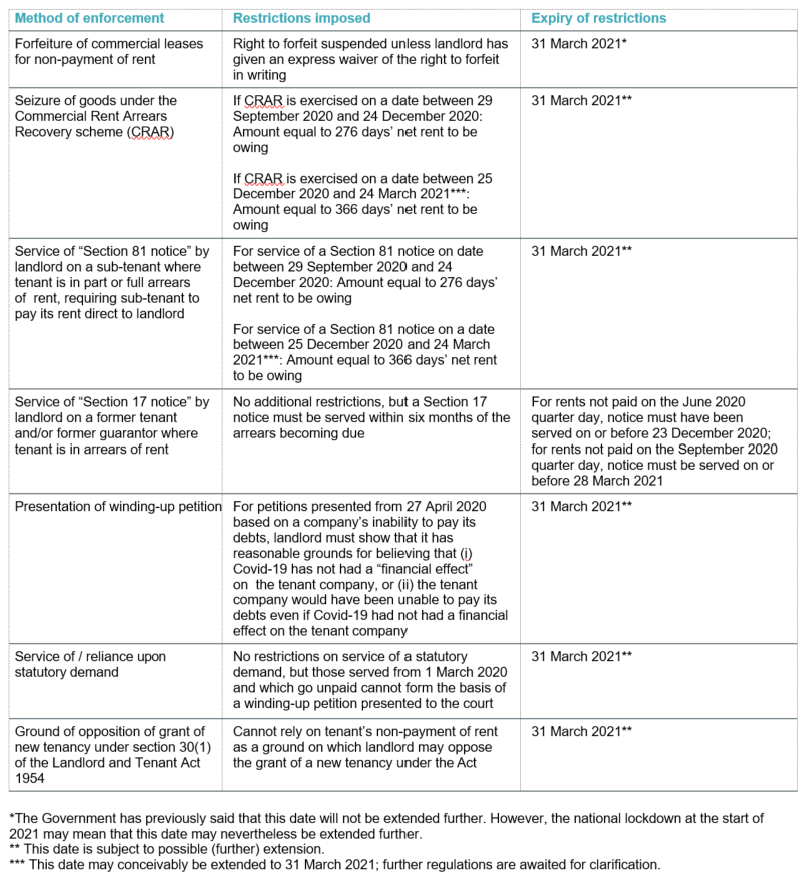Since March 2020, when the Government passed an unprecedented raft of protective measures to restrict a landlord’s ability (in both the commercial and residential sectors) to pursue remedies for the recovery of arrears (but also other covenant breaches), the practical effect has meant that landlords have not been generally permitted to seek to take back premises from tenants based upon forfeiture for non-payment of rent during the Covid-19 pandemic. Additional restrictions on the use of Commercial Rent Arrears Recovery (CRAR) and restrictions on the service of statutory demands to prevent creditors (including landlords) from presenting winding-up petitions helped to complete this circle and afforded tenants with wide-reaching protections against enforcement action throughout 2020.
These protective measures were introduced as separate pieces of legislation but now run concurrently, and were supposed to be temporary in nature. However, throughout the course of 2020, landlords saw the availability of their usual gamut of enforcement options regularly pushed off into the horizon with the Government deciding (often very late in the day) to extend the moratorium/restriction deadlines. Since June 2020, commercial landlords and tenants have been encouraged to seek to agree rent concessions and have restructuring discussions (premised on a non-mandatory Code of Practice applying until June 2021, see here). Whilst commendable in some circumstances, this Code of Practice has not altered the fundamental underlying legal premise that, unless renegotiated with the landlord, rent arrears remain payable by tenants (and any guarantor) eventually.
The start of 2021 appears to be no different for commercial landlords, at least perhaps in the short term.
On 31 December 2020, regulations were passed extending the moratorium on bringing proceedings for forfeiture of commercial premises based upon non-payment of rent (under section 82 of the Coronavirus Act 2020) to 31 March 2021. However, this extension has been described by the Housing Secretary, Robert Jenrick, as “final” and so commercial landlords can perhaps breathe a sigh of relief that the end may be in sight before they can finally forfeit a lease for non-payment of rent without restriction. That being said, the announcement that this extension is supposed to be final was made prior to the announcement of the national lockdown on 4 January 2021, and so it is entirely possible that this date will nevertheless be extended further on the basis that the new lockdown has fundamentally changed the circumstances.
The table below lists the current enforcement rights of landlords which have been subject to restrictions, what those restrictions involve, and when the restrictions will expire.

Evictions ban announcement
Furthermore, on 8 January 2021, the Government announced that it would be extending by six weeks the ban on bailiffs conducting evictions (except for the most serious cases, eg trespass, extreme rent arrears equivalent to six months’ rent, anti-social behaviour, death of a tenant where the property is unoccupied, fraud and domestic abuse) which was due to expire on 11 January 2021.
This means that, whilst the wide-ranging stay on issuing possession proceedings at Court was lifted on 21 September 2020, the practical effect of this announcement means that no evictions can now take place until at least 21 February 2021.The Government has further stated that no evictions are expected until 8 March 2021 at the earliest and this is being kept under review.
What enforcement options remain available to landlords now?
Despite the range of protections currently available to tenants, landlords still have available to them the following range of enforcement measures either individually or in combination:
- drawing down on rent deposits and seeking top-ups;
- claiming against current guarantors;
- claiming against Authorised Guarantee Agreements (AGA) or Guarantees of Authorised Guarantee Agreements (GAGA) for post-1996 leases;
- claiming against former tenants or former guarantors for pre-1996 leases;
- deploying the remaining CRAR remedies, subject to the additional restrictions imposed and set out in the table above;
- (following the lifting of the stay in September 2020) issuing or progressing proceedings for possession, brought on the basis of breach of covenant other than that to pay rent (but subject to the evictions ban restriction referred to above); and
- County Court/High Court commencement and service of proceedings for debt.
Whilst several restrictions still remain, the Government’s announcement of a “final” extension of the moratorium on forfeiting a lease for non-payment of rent until 31 March 2021 is perhaps an indication of the important balancing act that needs to be made between the competing interests of landlords and tenants, having regard for example to the fact that commercial landlords will generally have their own commitments, most critically in the form of their debt/finance arrangements.
With the national lockdown in full effect at the start of 2021, and a growing sense of unease about when things will “return to normal”, the Government’s latest announcement was an indication of some change of position. It seems entirely possible however that the current circumstances may mean that additional extensions may come into effect despite this. If so, it remains to be seen whether this will be the current (effective) blanket ban, or something more nuanced, perhaps based upon actual ability of tenants to pay. In that regard, the British Property Federation has identified what it calls a class of "can pay, won't pay" commercial tenants that it considers may warrant an exception to the rule. The position is unlikely to be considered again by Government before early March 2021.
For further information, please contact:
Key contacts
Disclaimer
The articles published on this website, current at the dates of publication set out above, are for reference purposes only. They do not constitute legal advice and should not be relied upon as such. Specific legal advice about your specific circumstances should always be sought separately before taking any action.
